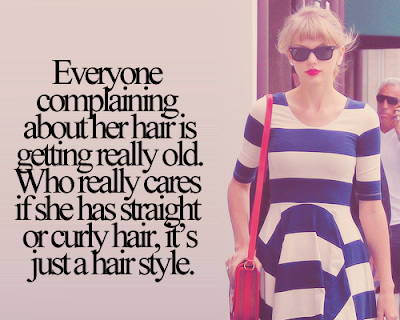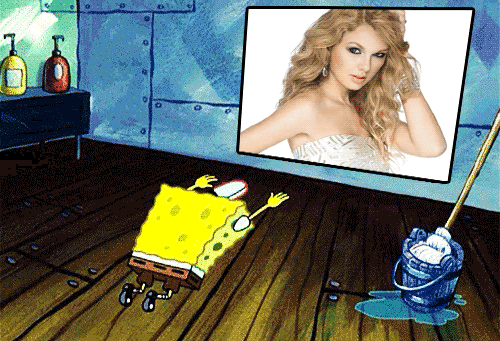I came across a few Swiftie blogs on tumblr the other week, which got me thinking about the rise and fall (and rise again) of Taylor Swift's career. I define myself as a strictly Swift-neutral person: I like some of her older songs, but if her music totally vanished from cyberspace tomorrow, I wouldn't be able to give less of a fuck.
Still, some of my clearest childhood memories are underscored by her music. Simple moments like swaying in my bedroom while listening to Love Story on my green iPod nano or gasping when a friend confessed at a sleepover she didn't know who Taylor Swift was....if it weren't for T-Swizzle, I'm sure those moments would have slipped my memory.
Up until 2012, people seemed to more or less like Taylor Swift, and as a girl who grew up in the suburbs, I was repeatedly told that she was the ideal role model because of her goody-two-shoes persona. But then she started transitioning into pop territory and began plaguing the radio with bland edm-infused country pop.
"She's not even from Nashville," my friends would complain whenever someone played Trouble or 22 while rolling their eyes. "She's from a Christmas Tree farm in Pennsylvania. She's a poser." Even the girls in my class who were of prime Swiftie demographic disliked her because of the obviously fake PR relationship she had with Harry Styles. Taylor seemed more like an annoying pop star wannabe than a teenage girl who someone stumbled upon fame by writing love songs in her bedroom. I, and many of my friends, stopped listening.
But then she came out with 1989, which cemented her transition into pop music and was considered an "actually" good album. It also helped that she got fun. guitarist Jack Antonoff to produce some of the tracks which gave her some indie cred (I was also a huge fun. fan back in the day). Her 1989 era also coincided with her infamous girl squad and the rise of the girl boss, so Taylor Swift became the poster child of fourth-wave feminism. After all, she was a strong, successful woman who called out the sexism she faced and supported her peers—isn't that, like, what the definition of what a feminist is?
Just as soon as Taylor Swift was lauded as a feminist icon was she spurned as one. As feminist discourse online shifted from "girls supporting girls" to intersectionality, largely due to the rise of the Art Hoe Collective and the Black Lives Matter movement, it was clear that Ms. Swift's "feminism" really only benefitted her and her fellow rich, white celeb friends. The Kanye controversy—in which Kim Kardashian released an edited phone call to make it seem like Taylor consented to the lyric "I made that bitch famous"—turned her into a figurehead for white feminism and victimhood.
"How Taylor Swift Played The Victim For A Decade And Made Her Entire Career," a Buzzfeed article that gained a lot of traction during Taylor's downfall/Reputation Era, chronicles the Kanye-Taylor feud and its fall out. I don't want to get too into it (this post is already long enough), but I think it's a good example of how public perception of Taylor changed by the end of the 2010s:
"Following the fallout with West and Kardashian, this positive perception of Swift is now in tatters. The feud exposed the truth that white fragility is the most imperative component of Swift’s success...It proved that Swift recognised the power her white womanhood affords her – presumed innocence and empathy – and used this to her advantage in repeated acts that she surely knew would damage West’s reputation and strengthen her own. Swift propagating this narrative of fragile white womanhood to villainise a black man is “ruthless” at best, and at worst, dangerous."
Yeah. I think a lot of people (myself included) were tired of seeing her all the time in the news and touting her white feminism when more important things—like Trump winning the presidency—were going on. And then she put out Reputation, which was a pretty cringe-y album, so I thought that would be it for her. I actually remember one of my music industry professors talking about her career one day in class: "She's like Michael Jackson. She has too many yes-men around her. That's why she hasn't released any good music lately."
So imagine my surprise when Taylor dropped Folklore out of nowhere in 2020 and everyone starts loving her again like it was 2010. I thought the height of her career was over, but it had clearly just begun: her follow-up albums Evermore and Midnights, as well as her re-recorded albums, made her a bigger star than ever, and her Eras Tour has grossed over a billion dollars.
Taylor Swift seems to be inescapable right now, and I'm curious as to where her career will go next. Back in 2015 when her 1989 era came to a close, she astutely said "I think I should take some time off. I think people might need a break from me," in an NME interview. She was still self-aware enough to know she was overexposed and needed to take a breather.
But now? Taylor Swift is wayyyyy more overexposed than she was in 2015 and shows no signs of slowing down. She even announced she was releasing a new album at the Grammys, which was a move that rubbed lots of people the wrong way (but hardcore Swifties didn't seem to mind at all, and I guess they're the only people who matter to Taylor and her team.) I mean, you know what they say: the bigger they come, the harder they fall. It's hard to imagine Taylor Swift being bigger than she is right now, and I'm sure things will turn on her sooner or later.
Like I said earlier, I only care about my own experiences with Taylor Swift and how public perception of her mirrors our cultural attitudes because I am a nostalgic nerd. To me, I'll always like and remember her best as a blonde-haired teenager with a guitar singing country songs in her bedroom. These 2010s swiftie blogs remind me of how I used to look up to Taylor Swift before growing out of her music and persona—a time when I still had excitement for the future because I, too, was innocent and believed there were so many possibilities.























No comments:
Post a Comment